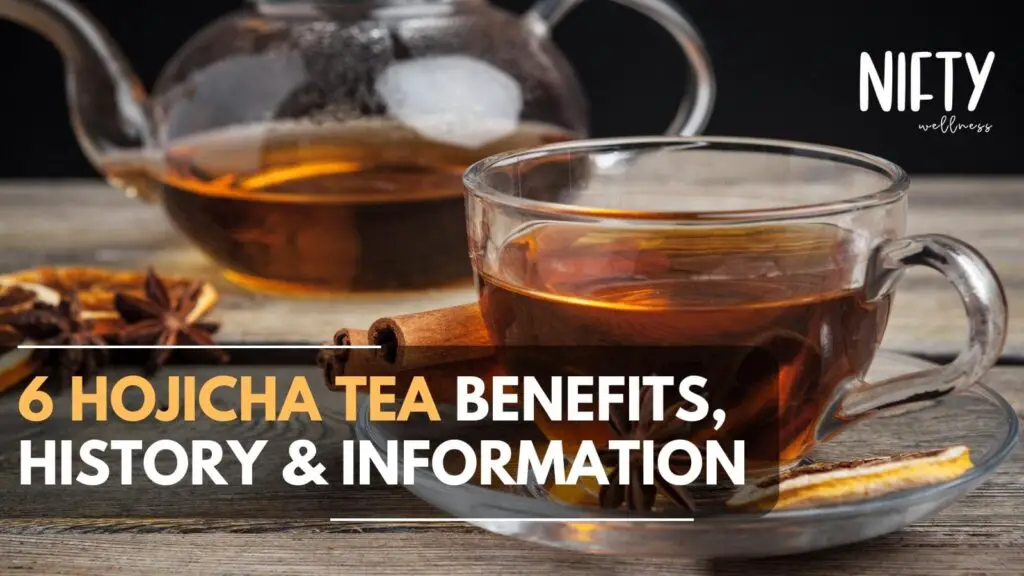Embark on a flavorful journey into the world of Hojicha tea, exploring its rich history, nuanced flavours, and a treasure trove of benefits in this enlightening blog. Delve into the aromatic realm of Hojicha, uncovering its unique qualities and addressing common queries like “Does Hojicha have caffeine?” Unravel the numerous Hojicha benefits that make this roasted green tea popular. From its distinct taste to potential hojicha tea benefits, this blog promises to be your guide to understanding and savouring the delightful world of Hojicha tea.
What Is Hojicha Tea?
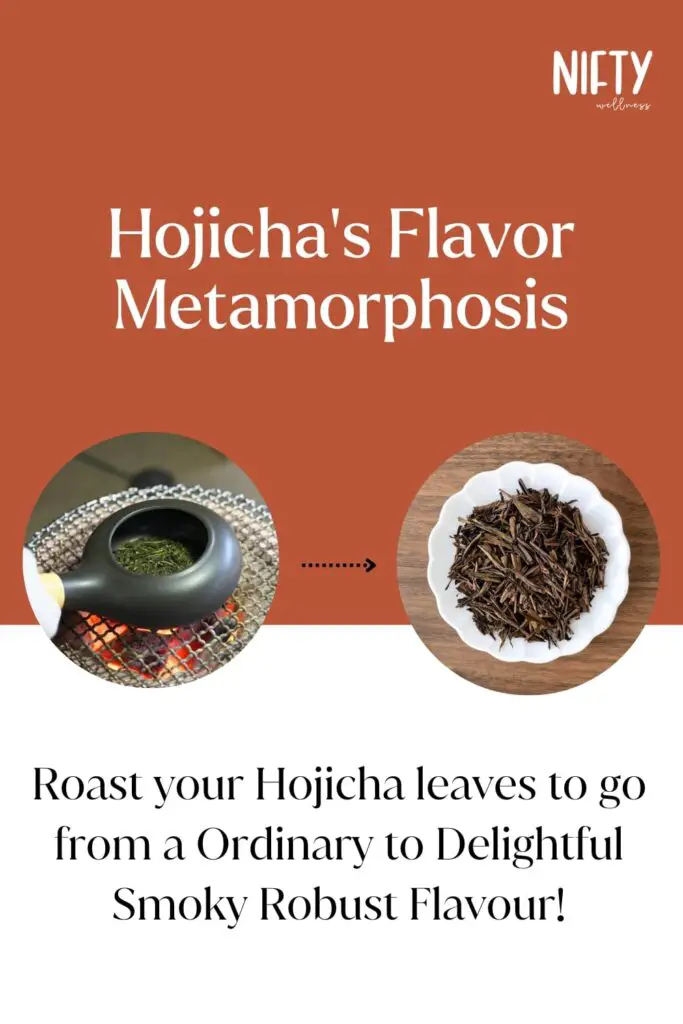
Hojicha, which means “roasted tea” in Japanese, is a type of green tea. It was first brewed in Kyoto (the green tea capital of Japan) in the 1920s.
The story of its origin tells of a merchant with leftover tea leaves and stems. Rather than letting these parts go to waste, he roasted them over charcoal, and thus, hojicha was born.
Hojicha green tea is initially processed like all green teas. The leaves are first harvested, then they are steamed and oxidized, dried, and then rolled.
To make hojicha, the leaves go through an additional stem where they are roasted over charcoal, turning the leaves from green to brown.
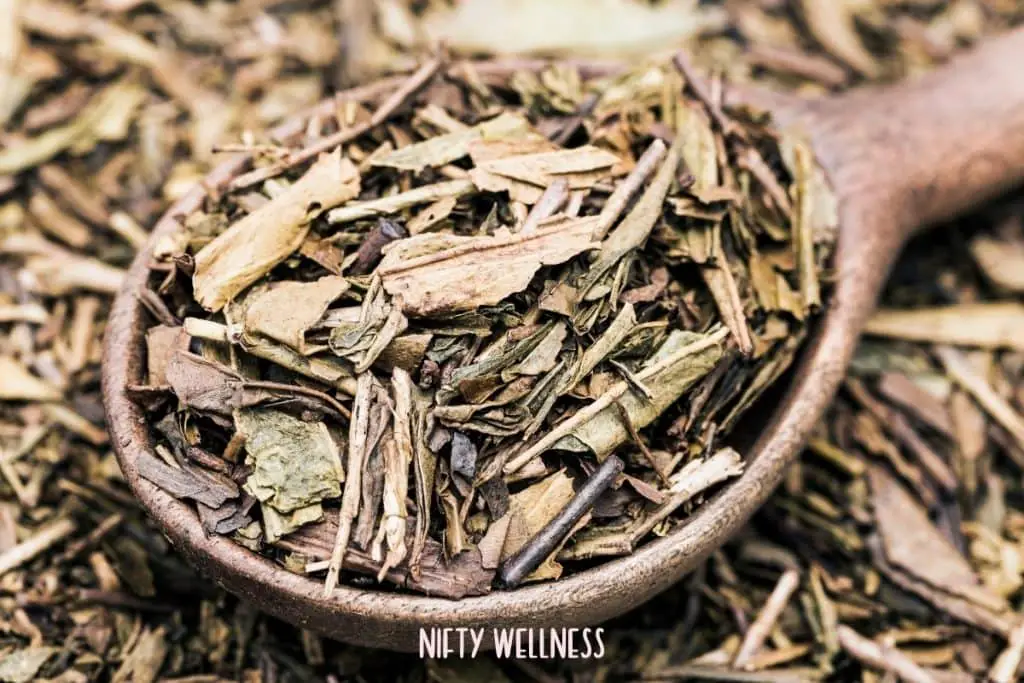
This step in the process results in a warm, smoky, toasted, caramelized flavor that is unique to hojicha green tea.
The roasting process makes hojicha’s leaves less bitter and milder in taste while also setting off chemical changes in the tea leaves that reduce the tea’s caffeine levels.
Thus, hojicha is a mild tea that can be enjoyed at any time of the day.
Hojicha is typically made from Sencha and Bancha leaves, depending on the harvest season. Sencha leaves, which constitute most of Japan’s green teas, are produced from the first harvest of leaves and make for a high-quality hojicha brew.
Bancha leaves come from the second harvest and naturally have a more subdued flavor compared to Sencha.
Delve into the nuances of Sencha and Hojicha, two beloved Japanese green teas, in this comprehensive comparison “Sencha vs Hojicha: A Detailed Comparison of Two Popular Japanese Green Teas“.
Benefits Of Hojicha Tea

This mild, soothing green tea is an enjoyable tea that offers a plethora of health benefits. Discover the wonderful world of Hojicha tea, renowned for its delightful roasted flavour and a multitude of health perks. If you’re wondering about the caffeine content in Hojicha, rest assured—it’s a low-caffeine option, making it suitable for those cautious about stimulants. Packed with antioxidants, this green tea not only bolsters your immune system but also helps combat oxidative stress. Embrace Hojicha for a calming experience, perfect for winding down and nurturing your mental well-being. Explore the benefits, history, and more as we delve into the essence of Hojicha tea.
Promotes Relaxation & Eases Stress
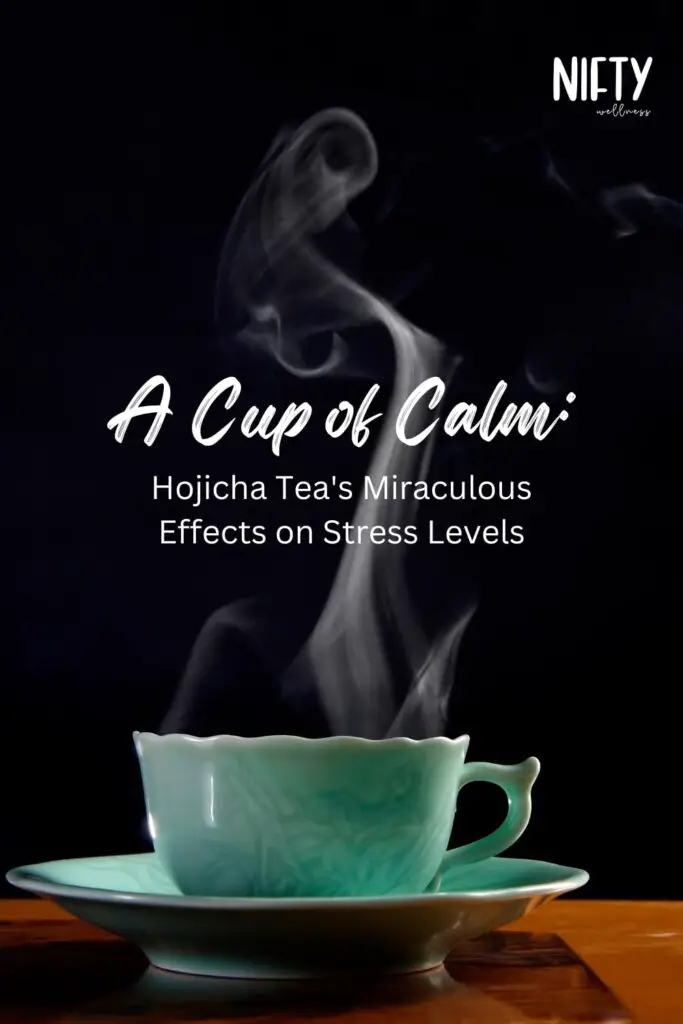
Hojicha tea is one of the best teas for promoting relaxation, in part due to its intoxicating aroma and low caffeine levels. Hojicha tea also contains the amino acid: L-Theanine.
Research suggests that this amino acid promotes relaxation without the adverse effects of drowsiness. L-Theanine also eases mental and physical stress by promoting alpha brain wave generation, as shown in this 2008 study.
Boosts Immunity
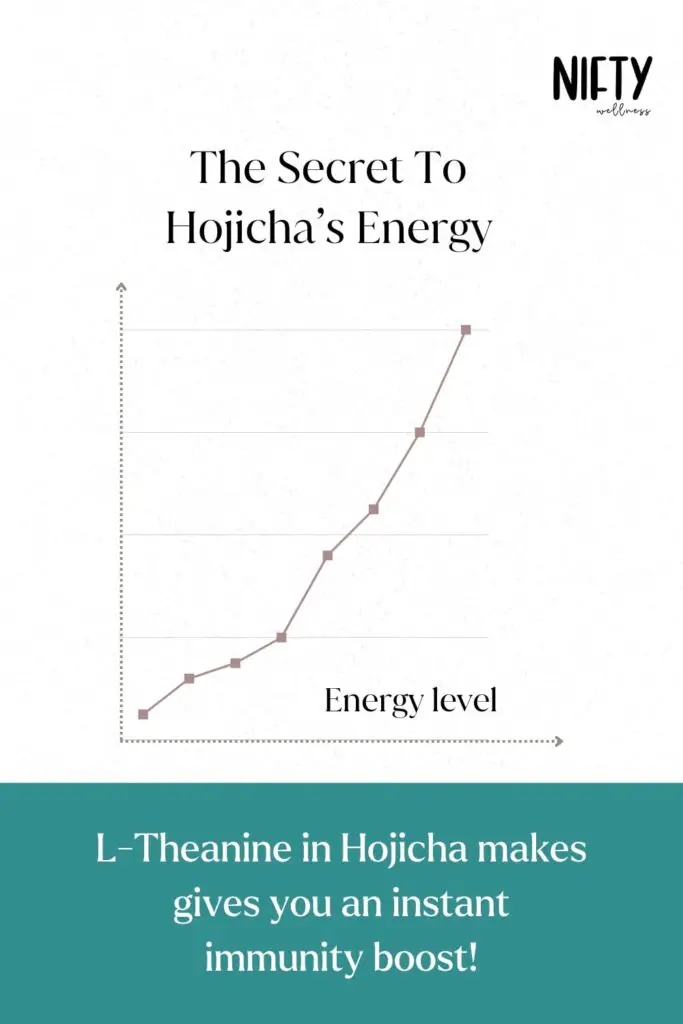
Vitamin C and antioxidants found in hojicha roasted green tea are known to help the body warn off signs of infections by regulating the immune system and reversing the effects of a compromised immune system.
In addition, research suggests L-theanine levels found in hojicha tea could boost the function of the body’s immune system, as one study found L-theanine to decrease the incidence of upper respiratory tract infections.
This powerful amino acid can also reduce inflammation in the body, keeping all systems operating effectively.
Controls Blood Pressure

Hojicha’s bountiful levels of L-theanine are beneficial for those struggling with raised blood pressure.
One study concluded that L-theanine not only reduced stress and anxiety but that its anti-stress effects on the nervous system also reduced blood-pressure in high-stress-response adults.
Full Of Antioxidants
Hojicha tea is naturally high in antioxidant polyphenols that reduce inflammation in the body and help fight the development of disease. Hojicha tea also contains catechins, antioxidants that protect the body from damage and disease.
One catechin found in green teas like hojicha is Epigallocatechin Gallate or EGCG. This potent polyphenol has been shown to reduce oxidative stress and inflammation, protect cells from damage and disease development such as cancer.
(If you like natural teas with antioxidants, check out our article about pomegranate tea.)
Anti-Cancer Potential

Drinking hojicha tea may be linked to lower cancer risk due to components in the tea that block carcinogens from affecting the body and inhibiting cancer cell growth.
One element of hojicha tea, L-theanine, has been linked to lower cancer rates in those who drank green tea (such as hojicha) than those who did not.
Hojicha tea is also high in tannins, a group of compounds with unique properties and health benefits.
One type of tannin, ellagitannin, has been studied as a potential cancer prevention and treatment due to its ability to reduce the growth and spread of cancerous cells.
Reduces Risk Of Chronic Disease
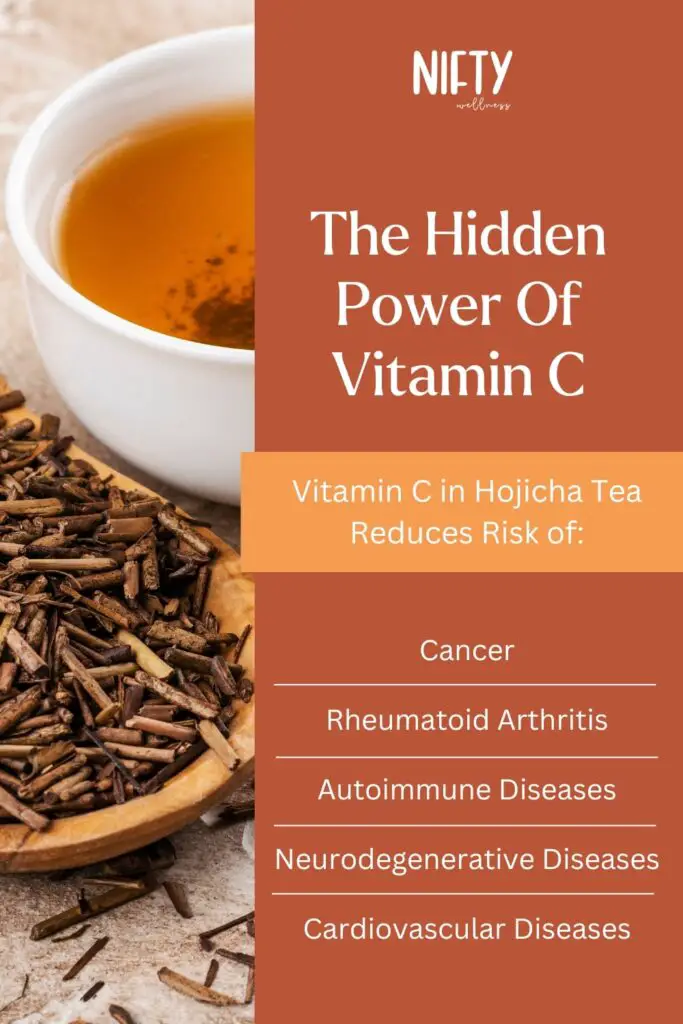
Regularly drinking green teas such as hojicha may help reduce your overall risk of chronic disease.
Hojicha is naturally high in the powerful anti-aging and immune-boosting antioxidant: Vitamin C.
Studies have shown that the oxidative stress from free radicals and oxidants plays a significant role in the body’s development of chronic and degenerative diseases such as:
- Cancer.
- Rheumatoid Arthritis.
- Autoimmune Diseases.
- Neurodegenerative Diseases.
- Cardiovascular Diseases.
Antioxidants, like Vitamin C, have the ability to prevent and repair oxidative stress and maintain one’s overall health.
Check out our latest blog The Best Loose Leaf Tea for Beginners. Experience the epitome of tea excellence with our collection of loose leaf teas.
Conclusion
In conclusion, the journey through the aromatic realms of Hojicha tea unveils a tapestry of not just delightful flavours, but a plethora of health benefits too. Originating from the rich tea culture of Kyoto, Hojicha’s unique roasted essence brings forth a warm, smoky, and caramelized flavour, setting it apart in the world of green teas. With a gentle touch on the palate and reduced caffeine levels, Hojicha ensures a soothing experience anytime. Beyond its indulgent taste, Hojicha emerges as a champion of well-being, promoting relaxation, boosting immunity, regulating blood pressure, and exhibiting potent anti-cancer and anti-inflammatory properties. Enjoy Hojicha not just as a beverage, but as a wholesome elixir weaving health into every sip.
Frequently Asked Questions

What Kind of Tea Is Hojicha?
Hojicha is a type of green tea. This comes as a surprise to some, considering the tea’s natural color. Hojicha’s red-brown hue results from its roasted tea leaves, as this process turns the leaves from green to brown.
What Is The Difference Between Hojicha And Matcha?
Hojicha and matcha are both green teas. However, unlike matcha’s exceptionally bright green color, hojicha tea is a reddish-brown color.
The tea leaves for both hojicha and matcha are first steamed and then dried. Hojicha can be ground into a fine powder, similarly to matcha, or its dried leaves, stems, stalks, and twigs can be used for a loose-leaf tea.
Hojicha has an earthy, smoky aroma compared to matcha’s fresher, green scent. Similarly, hojicha tastes sweet and smoky.
Because its tea leaves are roasted, hojicha is not bitter compared to other green teas such as matcha. A higher grade matcha will taste less bitter than a lower grade matcha, with more sweetness and umami.
Hojicha tea contains significantly less caffeine than matcha. Hojicha has only 7.7 mg of caffeine per cup compared to matcha’s 70 mg of caffeine per cup.
Is There Caffeine In Hojicha?
Hojicha is a natural green tea, but it has extremely low levels of caffeine compared to other blends. A 250-ml cup of hojicha tea contains only 7.7 mg of caffeine compared to 95 mg of caffeine in a 250-ml cup of coffee.
This makes hojicha an exceptional choice for those looking for a coffee alternative.
Why Is Hojicha Low In Caffeine?
Hojicha green tea’s low caffeine content is associated with its roasting process. Hojicha’s leaves and stems are roasted at high-temperature levels, reaching 200° Celsius.
This heat drastically reduces the tea’s caffeine levels as caffeine sublimes when it comes to its 178° Celsius boiling point.
In addition, Hojicha is made mostly of tea leaves, which contain less caffeine than the younger parts of the plants, such as shoots and stems, which have the highest concentrations of caffeine.
How Much Caffeine Is In Green Tea?
The average serving of green tea contains about 35 mg of caffeine. However, this amount can vary anywhere from 30 mg to 50 mg per 8-ounce serving.
The amount of caffeine in green teas fluctuates according to preparation methods, harvesting seasons, growing conditions, and so on.
When Is The Best Time To Drink Hojicha Tea?
Unlike other green teas that are best consumed in the morning due to their caffeine content, hojicha green tea can be enjoyed any time of day. Its low-caffeine content and relaxation-inducing compounds make it an all-around great beverage.
Is Hojicha Tea Good For You?
Hojicha tea is an excellent tea that benefits your overall health and wellness. Its antioxidants fight and prevent disease and oxidative stress, while components like L-theanine control blood pressure and ease physical and mental stress.
What Does Hojicha Tea Taste Like?
Hojicha tea is a great tea for those who enjoy the taste of coffee, as it has a similarly bold, smoky, slightly sweet flavor that comes from the roasted green tea leaves. Hojicha tea can be enjoyed sweetened with honey or other natural sweeteners.
Is It Hojicha Or Houjicha?
In Japanese spellings of hojicha (ほうじ茶), there is a “う” which sounds similar to the English “u” when in combination with the “hō” sound.
However, the long vowel sound of “hō” neutralizes and loses its purpose when translated into English, making the English spelling: Hojicha.
